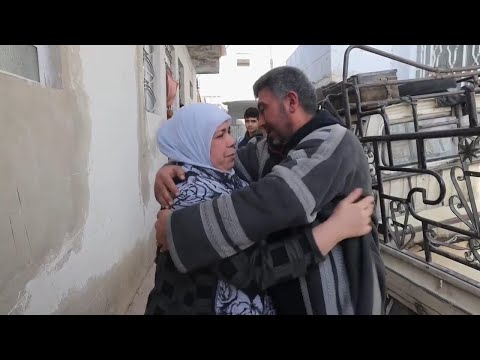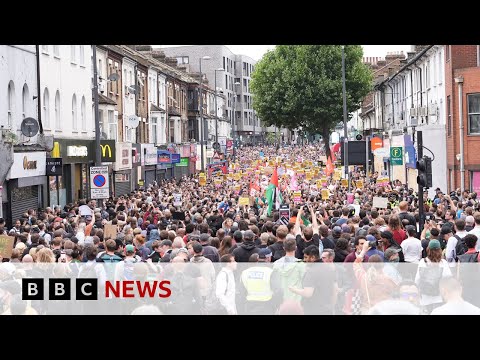(10 Dec 2024)
RESTRICTION SUMMARY:
ASSOCIATED PRESS
Damascus – 9 December 2024
1. Various of relatives and neighbours welcoming Hassan Fayoumi, a member of the Syrian opposition who returned on Monday to his home
2. Various of Fayoumi embracing and kissing his sister and brother
3. SOUNDBITE (Arabic) Hassan Fayoumi, Syrian returnee:
“When I left (in 2014), the regime seized my house, stole all the things, seized our land and did not leave anything for us. We fled thanks to God with our religion and dignity.”
4. Fayoumi opening curtain in his house
5. SOUNDBITE (Arabic) Hassan Fayoumi, Syrian returnee:
“Thank God, we have prepared ourselves and returned with glory and with a joy that we cannot express. We cannot express our joy to anyone, thank God. May God bless us and others with the victory and the proud return, our heads are raised. We got rid of the tyrant."
6. Fayoumi with his relative
7. SOUNDBITE (Arabic) Hassan Fayoumi, Syrian returnee:
“God willing, may God release the detainees so that I can see my brother who is detained, may God release him in the name of the beloved (Prophet) Mohammed, with the help of the young people who are working in Saydnaya prison. This is our way to them. We will help them to see who is still alive and release them. God willing, I hope my brother and our friends will be among those who are still alive there.”
8. Close of person playing drum
9. Fayoumi at entrance of his house saying, UPSOUND (Arabic): "Thank God who rid us of the regime"
STORYLINE:
Thousands of fighters and displaced people have returned to their homes in Damascus, following the ouster of Syrian President Bashar Assad by rebel forces.
In a village on the northeast outskirts of the capital, the family and neighbours of Hassan Fayoumi, a member of the Syrian opposition, celebrated his return on Monday, nearly 10 years after he fled.
In 2014, Fayoumi was called by the Syrian security services for interrogation.
He fled to the north of the country where he joined opposition rebels.
It took 10 days for Syria’s insurgents to march from their stronghold in the northwest into Damascus and bring down the Assad family rule that had gripped the country for half a century.
As Fayoumi entered the narrow alleys of his neighbourhood, women trilled as one played a drum.
He embraced his sister and brother whom he had not seen for nearly 10 years.
“The regime seized my house, stole all the things, seized our land and did not leave us anything,” Fayoumi said.
"Thank God, we have prepared ourselves and returned with glory and with a joy that we cannot express," he said, adding that “we got rid of the tyrant.”
During Assad’s rule and particularly after the 2011 protests began, any hint of dissent could land someone in Saydnaya prison, a place so notorious for its horrors it was long known as “the slaughterhouse." Few ever emerged.
In 2017, Amnesty International estimated that 10,000-20,000 people were being held there at the time “from every sector of society.” It said they were effectively slated for “extermination.”
Thousands were killed in frequent mass executions, Amnesty reported, citing testimony from freed prisoners and prison officials. Prisoners were subjected to constant torture, intense beatings and rape. Almost daily, guards did rounds of the cells to collect bodies of inmates who had died overnight from injuries, disease or starvation. Some inmates fell into psychosis and starved themselves, the human rights group said.
Fayoumi’s brother was detained in Saydnaya.
AP video shot by Omar AlBam
Find out more about AP Archive: http://www.aparchive.com/HowWeWork
Twitter: https://twitter.com/AP_Archive
Facebook: https://www.facebook.com/APArchives
Instagram: https://www.instagram.com/APNews/
You can license this story through AP Archive: http://www.aparchive.com/metadata/youtube/66c3696876cd4434bc29dc738bd05288
Author: AP Archive
Go to Source
News post in December 15, 2024, 6:04 pm.
Visit Our Sponsor’s:
News Post In – News





